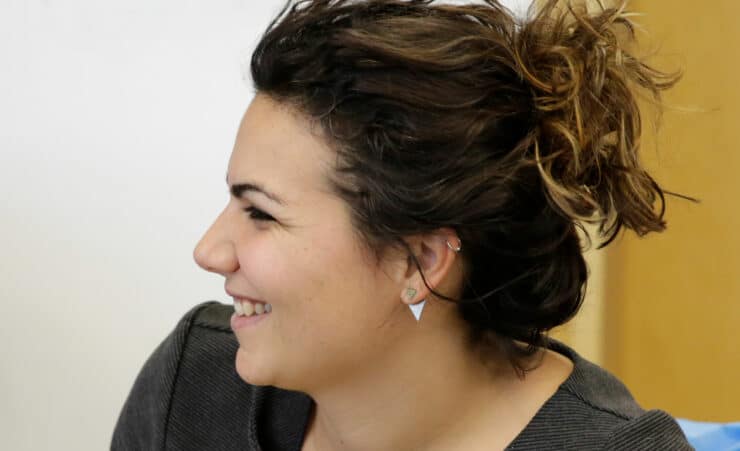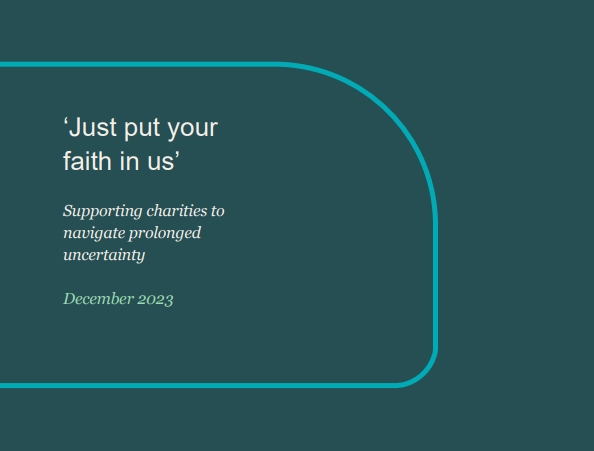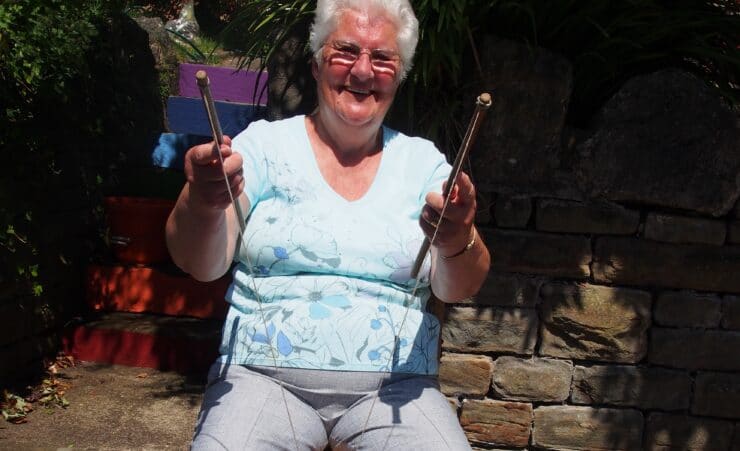
Bringing trust-based learning to life: four actions for funders
Steps for more effective social change
Introduction
Our work with funders and charities on Open and Trusting Grant-making has revealed the importance of trust-based learning as a vital part of that commitment. Throughout 2023, across the Roundtable community of almost 70 trusts and foundations, we’ve been grappling with the question:
How can we bring trust-based learning to life in a way that responds to the needs of different actors in the learning system and builds collective wisdom for more effective and equitable social change?
Trust-based learning sees charities and funders as equal partners in building collective wisdom to advance equitable and effective social change. It:
- Values the perspectives of charity staff as experts
- Reduces foundation-driven demands on charities’ time
- Protects funded organisations’ agency and flexibility
- Addresses questions that matter to charities
- Diversifies the range of information brought to the table
- Is grounded in reciprocity and mutualism
In November 2023, our Community of Practice of foundation evaluation and learning staff came together to support each other in their efforts to make this aspiration a reality for members of the Roundtable Community. The questions they explored included:
- How can we engage grantee partners and leaders with lived experiences in learning conversations in a way that is empowering, safe, non-extractive, and mutually generative and enriching?
- How can we move to a more trusting approach when board expectations and internal systems focus on performance management, including outputs, outcomes and key performance indicators (KPIs)?
- How can we become more proportionate and more trust-based in our reporting requirements?
- How should we respond when more trusting relationships mean funded partners share significant challenges and needs?
- Can we build a trust-based culture with partners and still focus on impact?
- How can we build trust-based approaches internally – both within the staff team and with trustees – in the context of both power dynamics and limited time for in-depth discussion?
Four actions for funders
Debate at the Community of Practice suggests four actions to help funders go further:
1. Challenging our preconceptions
‘If you’re going to be open to learning – really letting different perspectives and ideas come into your organisation and into your processes – it will mean rethinking some quite well-established routines and frames for the work’.
Evaluation and learning staff are working to present this as a positive opportunity to test and challenge long-held assumptions, address concerns often raised by trustees or grants staff, and build different models of trust-based learning that suit different kinds of grant and different relationships between funders and the organisations they support.
What helps?
Being clear that ‘being trust-based is not a free-for-all’:
- Acknowledging that good processes are not ‘top-down’ or designed only with our needs as funders in mind.
- Understanding that charities expect us to have robust processes but want these to be transparent, meaningful and respectful of real-life constraints.
- Recognising that by listening to charities, learning from them and adapting to their needs, we can develop processes that are well-informed, robust and realistic.
- Not being secretive. Being transparent and clear about what information will be used for − and by whom − and when and how it influences our decisions and practices.
Challenging assumptions that ‘trust’ and ‘impact’ are incompatible, and championing the powerful contribution of trust-based learning to our understanding of how change happens:
- Being clear about what our role is in understanding impact – what we want to understand, over what time frame, at what scale and for what purpose. And being equally clear about what is not our responsibility or concern.
- Recognising that social change work is complex and messy, that both we and the organisations we support are ‘actors in an ecosystem’ and that we all need to focus on contribution − not attribution − in assessment of our impact.
- Developing ‘sober and proportionate’ expectations of impact, which fully acknowledge the volatility of the operating environment.
- Identifying the risks of not making the shift to trust-based learning in the face of clear messages from charities that top-down, performative systems ‘lead to organisations just telling funders what they want them to hear. But how is that helping us solve complex social problems?’.
Keeping an open mind on what ‘relational funding’ looks like:
- Recognising that, while trust-based learning calls for trusting relationships with the organisations we support, these relationships don’t have to be intense or close – trust can be built in simpler, less demanding ways.
- Being realistic and proportionate about the capacity charities have for intense engagement with funders – and about the value it delivers to them. Some charities report that ‘foundations shifting to emphasise learning rather than command and control oversight is better in spirit but can easily become just as extractive and demanding’.
- Being ready to become part of a genuinely collective effort to understand how best to achieve shared goals, rather than insisting on holding our own unique learning relationship with our own subset of grantees.
2. Putting effort into reaching agreement internally
Trust-based learning opens up channels and conversations about change that can seem at odds with the ways both trustees and grants staff currently think about their roles. Shifting to a trust-based approach is a journey, and evaluation and learning staff are working out how best to support their foundations along the way.
What helps?
Securing the backing of trustees:
- Recognising that learning is a governance issue and a shift to trust-based learning must have the active support of trustees.
- Identifying how the board perceives its role and, where necessary, encouraging a shift of attention towards its responsibilities as ‘custodian of the mission rather than just custodian of the money’.
- Taking a pragmatic and incremental approach, working to overcome the constraints on trustees’ time and capacity to engage.
- Acknowledging and addressing internal power imbalances that can inhibit open and informed debate between trustees and staff: ‘How far can you really go, speaking truth to power internally?’.
- Bringing funded organisations’ voices to the attention of board members and enabling direct engagement.
- Placing learning at the top of the board agenda by, for example, starting board meetings with a ‘learning conversation’ or framing debate about performance around questions like ‘What are we learning about …?’; How can we be better at …?’.
Focusing on what really matters:
- Being clear and honest about the purpose, value and use of every piece of data we are collecting.
- Being rigorous about how we judge our own performance and progress, ‘taking on the effort of learning from the grants ourselves’ and bearing the cost of data collection, collation and sensemaking.
- ‘Asking the right questions enables us to challenge ourselves and be really clear on the rationale for why we are making a decision. The more we learn, the more we have to change’.
3. Being trustworthy – listening, learning and adapting
Charities are clear. Without trust, learning is compromised: ‘You just fill in the form for this person and tell them what they want to hear’. Trust is not measured by the depth or frequency of engagement. It is about achieving ‘a reciprocal relationship’, characterised by ‘predictability or consistency of behaviour, transparency and goodwill (defined as not taking advantage of the other actor for one’s own benefit at a cost to them)’.
What helps?
Creating the conditions for more candid, reciprocal learning that benefits everyone:
- Communicating with transparency about information use and candour about decision-making.
- Respecting charities’ boundaries.
- Developing routines to allow charities to challenge the foundation’s strategic ideas and assumptions.
- Explicitly cultivating behaviours and standards among staff that demonstrate trustworthiness.
Being clear and honest about how we will respond when charities trust us with their challenges:
- Being clear with funded organisations that we understand the unpredictability and volatility of their work and want to help everyone move away from performative cultures.
- Asking what (if any) regular support mechanisms – for example, facilitated peer support sessions – would add value.
- Deciding what direct support we can offer to charities if challenges arise, for example through: funder plus activities; one-off payments for mentoring sessions; a team retreat to create space for the charity to work things through; or building a contingency budget into grants to give funded organisations financial flexibility to see off challenges before they come to a head.
- Being open about any circumstances in which we will be unable to respond in a supportive way.
- Putting it in writing: ‘it would help get the messiness into the open and set the tone for the relationship and the approach to learning’.
4. Building a shared agenda for collective learning
Trust-based learning cannot be imposed. Funders must be ready to bring their needs and priorities to the table alongside those of funded partners, and to be ready to adapt or set aside elements of their agenda in the light of what they hear.
What helps?
Thorough preparation and planning:
- Achieving a shared agenda for all our learning activities that is explicit about their purpose and expected value.
- Making sure that the design of the process is sufficient for the agreed purpose but not more onerous than necessary.
- Offering funding or other resources to enable all partners to participate well.
- Never treating lived experience as an add-on but building it in from the start.
Giving attention to power dynamics and potential pressure points:
- Accepting that different views will exist and understanding how to work well with the tension that this will inevitably create.
- Being clear about our role as a funder. If we are trying to participate as an equal partner, what steps are we taking to minimise ‘the distorting power of money’? If we are positioned as an intermediary, do we have the independence and skills to do this well or would it be better to use an outside facilitator?


